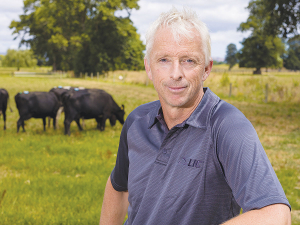LIC lifts half-year revenue on strong demand for dairy genetics
Herd improvement company LIC has posted a 5.2% lift in half-year revenue, thanks to increasing demand for genetics.
 LIC chief scientist Richard Spelman says this cuttingedge technology is another tool to help farmers produce more milk from less cows.
LIC chief scientist Richard Spelman says this cuttingedge technology is another tool to help farmers produce more milk from less cows.
Kiwi farmers can now identify their superior cows before they start milking thanks to a new service provided by LIC.
The co-operative's genomic evaluation service screens an animal's DNA to find out what genes it received from its parents. This provides a more accurate prediction of its expected performance in the milking herd, helping farmers better select their top cows to breed from and increase the rate of genetic gain on farm.
LIC chief scientist Richard Spelman says this cutting-edge technology is another tool to help farmers produce more milk from less cows.
"As New Zealand's cow population containers to reduce, Kiwi farmers are focused on improving the quality and efficiency of their herd. Breeding the best quality heifer (female) calves from the highest genetic merit cows plays a critical role in achieving that."
Spelman says this service allows farmers to get a look into the future and identify their herds' superior performance when they're young calves.
"Traditionally, farmers have to wait a few years until their heifers are milking and have had a couple of herd tests to get a reliable understanding of their performance.
"By drawing on information from an animal's DNA we're able to fasttrack that process and provide farmers with an early indication of their highest genetic merit animals so they can make a concerted effort to breed replacements from them."
Spelman says without genomic evaluation, a parent average is used to predict a calf's performance.
"A parent average isn't the most reliable prediction because it's based on the offspring inheriting an average set of genes from each parent. In reality, they'll have a random mixture of genes from both parents - some will be better and some will be worse.
"Including a calf's DNA in its evaluation provides a much clearer understanding of which genes it's acquired from its mum and dad so we can better predict how well it's going to perform. For a dairy cow, performance is measured by how efficient it is at converting feed into profit."
LIC uses the same technology to select elite young bulls for its breeding programme.
Spelman says the co-op's 30-year investment to develop and fine-tune genomic science, along with its recent purchase of advanced DNA technology, means it's now able to offer this service to farmers.
"LIC has made a significant investment into genomics because we passionately believe in its power to enhance herd improvement. We see the value our genomics investment is delivering to farmers through our high BW bull teams and we're excited to provide shareholders additional value from our investment through this new service," says Spelman.
LIC is able to produce a genomic evaluation using the same animal tissue sample farmers provide for DNA parentage testing.
Budou are being picked now in Bridge Pā, the most intense and exciting time of the year for the Greencollar team – and the harvest of the finest eating grapes is weeks earlier than expected.
The Real Estate Institute of New Zealand (REINZ) has released its latest rural property report, providing a detailed view of New Zealand’s rural real estate market for the 12 months ending December 2025.
Rural retailer Farmlands has released it's latest round of half-year results, labeling it as evidence that its five-year strategy is delivering on financial performance and better value for members.
OPINION: "We are back to where we were a year ago," according to a leading banking analyst in the UK, referring to US president Donald Trump's latest imposition of a global 10% tariff on all exports into the US.
DairyNZ says the Government’s proposed Resource Management Act reform needs further work to ensure it delivers on its intent.
Overseas Trade Minister Todd McClay says he's working constructively with the Labour Party in the hope they will endorse the free trade agreement (FTA) with India when the agreement comes before Parliament for ratification.